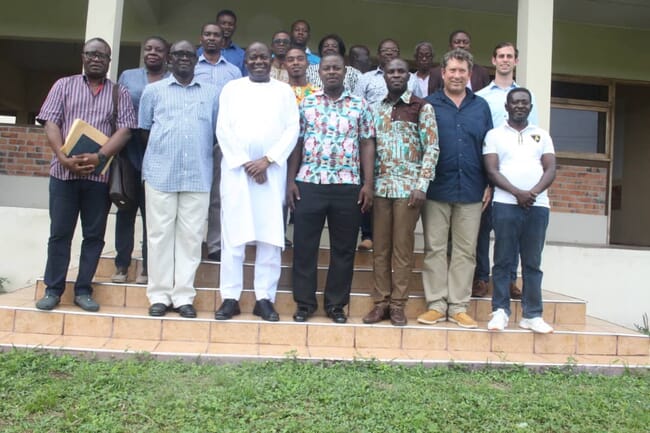“Aquaculture is crucial to addressing major economic problems in Africa today,” explained Henk Stander, from the Aquaculture Division of the University of Stellenbosch, who opened the event. “Whilst fish catches have declined considerably, there’s a pressing need for more marine protein to cope with high population growth.”

Stander was speaking at the recent workshop, Critical Insights in Fish Farming, which was jointly run by Ghana’s Ainoo-Ansah Aquaculture Centre, South Africa’s University of Cape Coast and Stellenbosch University. The programme was attended by senior managers in the aquaculture industry and by investors who were in the process of starting big budget fish farms.
Jacob Ainoo-Ansah, CEO of the centre and coordinator of the programme, said that the programme brought aquaculture practitioners up-to-date with current trends.
“For example, we dealt with issues relating to aquaponics at some depth, because it’s becoming important to optimise the use of water, and the appropriate systems must be integrated in our fish farms. In the light of new challenges being encountered with diseases, we also took a good look at health and disease management. And, since most fish farmers today are eyeing the export market, we surveyed the international market. Fortunately, we had two competent resources people to guide us. We expect to increase this collaboration in the coming months.”
Stander noted that most African countries were implementing aquaculture strategies and that the sector could play a useful role all over Africa, even in the countries that are producing high volumes of fish. He cited two interesting examples.
“In Malawi the inland water bodies have been overfished, and per capita fish consumption has dropped from 14 kg in 1970 to the current 5.4 kg. The need to increase production is urgent, and aquaculture possesses the capacity to help increase fish supply. What is needed now is investment in feed, technology and training.
“Namibia is a major fish exporter, but the bulk of her output comprises high value fish. Her per capita fish consumption is 11 kg, and the Minister of Fisheries and Marine Resources recently expressed his dissatisfaction with this figure, and committed himself to raise it to the world average of 21.4 kg per year.”
Stander also added that effective training, especially related to the use of new technology, is crucial for successful aquaculture production.
“New technology is available today which makes it possible to achieve high returns on investment and to increase badly needed fish output. It is our hope at Stellenbosch to contribute to the transfer of skills through this programme.”
Mark Joscelyne, also of Stellenbosch University, said their extensive experience in aquaculture research and extension service to farmers will be useful to African fish farmers at this crucial stage in the development of the industry.
“This workshop provided us with a good appreciation of the needs of the African industry. We have considerable experience in both research and in assisting fish farmers. This training programme offers a platform for close collaboration with colleagues around Africa.”
Isaac Bello, a Nigerian bank director, explained that he is taking early retirement to start a fish farm in Lagos State. “I have already secured a sizeable plot of land and mobilised some capital. I have been planning to enter aquaculture for some time now. I am glad I attended this programme because it has offered me the depth of information I needed. I have also made some useful contacts which will be beneficial in the near future. Now I know exactly what to do when I return to Nigeria”.
After more than two decades in the mining industry, Atta Mensah, a civil engineer, told the workshop that he has secured an extensive tract of land in Okorase in the Ashanti Region, having tested the soil and found it suitable for fish farming.
“There is a generous supply of good quality water. I will adopt the strategy to suit a combination of fish and vegetable and crop production,” he said.
Ainoo-Ansah is excited about the response to the online course which the centre is running jointly with Stellenbosch University.
“It’s reaching our target group – people working in aquaculture who may not have the opportunity to attend formal courses. The course has been designed to suit the needs of African fish farmers today, and we hope to be able to reach many people all over Africa in the shortest possible time,” he said.
Professor Anthony Afful Broni, vice-chancellor of the University of Education, described the online course as well suited to the target group. “Distance learning is a very useful method of training African farmers. Most of them do not have the capacity to attend formal courses. And as the head of a university for which distance education is a key activity, I find this online aquaculture course very innovative. The content material available to the student is considerable, and is presented in a manner that makes learning very practical.”


